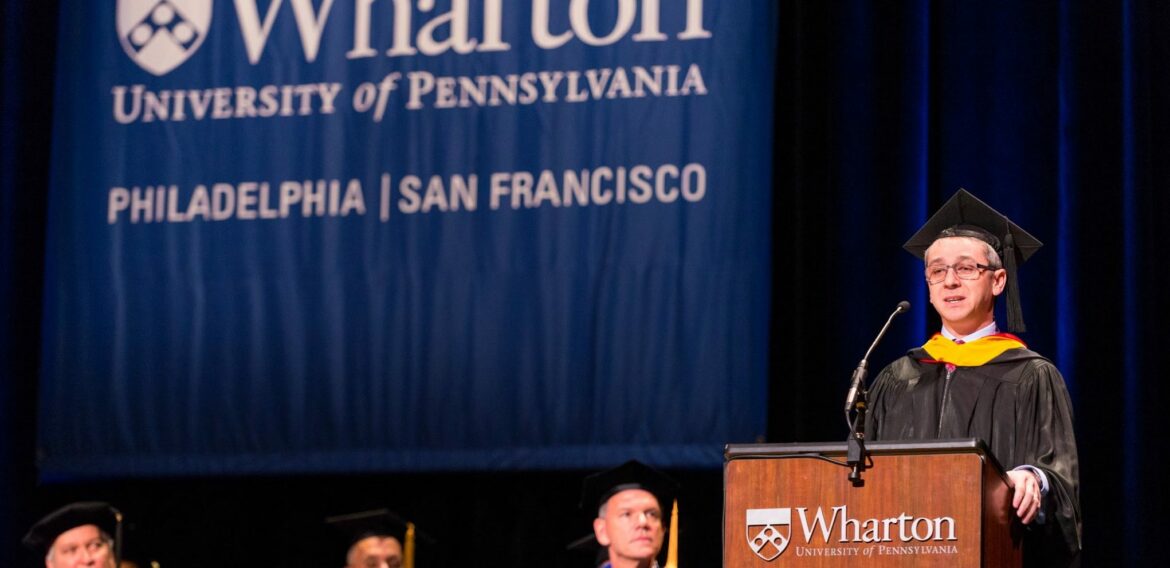Wharton EMBA Program
Barbara Craft, Dir. of Admissions @ Wharton San Fran Diane Sharp, Dir. of Admissions @ Wharton Philadelphia What is the one area of your program that you wish applicants knew more about? We want them to know more about the close relationships between faculty, staff, students and alumni. Wharton’s MBA Program for Executives has a residency requirement, which means students on each coast stay at the same hotel on class weekends. This creates an immersive experience, fostering very strong bonds during the two-year program. This program also provides a very high level of support and access to faculty and staff. In addition, Wharton has one of the largest alumni networks of any business school, which includes a very supportive community of Wharton EMBA graduates. What’s the single most exciting development, change, or event happening at your MBA program this coming year? The most exciting development is the increased interaction between our East and West Coast campuses and additional social impact initiatives. Mixing these populations is important for us so we are providing more opportunities for these cohorts to connect, such as holding a combined Orientation Week in Philadelphia, a blended class week in San Francisco, and a blended Global Business Week trip. We also offer second-year students the option of taking electives — or spending an entire term — on the other coast. Global Modular Courses provide even more chances to connect students from both coasts as well as full-time MBA students. As for social impact, this starts during Orientation Week when students work in teams on a social impact project and continues with the EMBA student-organized Social Impact Conference at Wharton San Francisco and multiple activities on each coast throughout the program. Walk us through the life of an application in your office from an operational standpoint. What happens between the time an applicant clicks “submit” and the time the committee offers a final decision (e.g. how many “reads” does it get, how long is each “read,” who reads it, does the committee convene to discuss it as a group, etc.) Once applicants click “submit,” we confirm that we’ve received all the required documents and that they have completed their interview. The sorting and filing of credentials is a manual process so it may take a few weeks to complete. Once the applications are complete, they are read thoroughly and reported on by multiple members of the Admissions team. When that process is complete, the files go to the Admissions Committee, where they are reviewed, evaluated and discussed in detail by Committee members from both the West and East Coast programs. Applicants spend a lot of time on their application and we will spend equally as much time or more. Decisions are released online on specific dates, depending on the respective round. Do you have any application tips (for essays & recommendations) for MBA applicants? For the essays, applicants shouldn’t tell us what they think we want to hear. They should tell us who they are and what shapes them. This is an opportunity to tell us about their goals, how this program fits with those goals, and what they hope the EMBA program will do for them. A mistake people make is being too vague about their career goals. It’s in their best interest to be specific and accurate. The application essays are important so people should proofread and make sure they are putting their best foot forward. For recommendations, we prefer recommenders who know the applicant well. We want to get a sense of what they’re like to work with or as an employee. Applicants shouldn’t go out of their way to find a former professor because, if they haven’t seen the applicant in 10 years, they may not add a lot of value. If an applicant owns their own company, they should consider asking someone from their board of advisors, a client, an accountant, a former manager, or someone they work with on a regular basis. What are the most important aspects of the MBA application process besides GMAT score, prior GPA and current job position? The interview is a very important part of the admissions process. Most interviews are conducted in person. The reason we prefer applicants come to campus in person is because they’ll be spending two years in a very rigorous program and we want to make sure Wharton is right for them and they’re right for Wharton. We want them to sit in on classes and meet students to get a sense of what it’s like to be a student here. They should slam the door and kick the tires like they would when buying a car. The interview part of the visit is a one-on-one conversation with a member of our admissions team where they can ask questions and we can find out more about the applicant as a person. Students learn as much from each other as they do from professors in this program so we want people here who like to learn and want to help others learn too. How can a candidate overcome a lower GMAT score? If it’s the first time they’ve taken the exam, they should consider a study plan and retake the exam. If the lower score is consistent, but their grades are good, they should discuss their academics with us and see if we can make some suggestions. Sometimes we coach people to take a math preparatory class before starting the program. As for the specific score range, we don’t use GMAT scores as a cut off, but it is something we look at in conjunction with the whole application and your background. What resources are available at your MBA program to assist with career advancement? We have a dedicated director of career management for our EMBA programs on each coast. Their focus is on partnering with students to identify where they want to go in their careers and helping them form a strategy to get there. They facilitate interactions with employers, innovators, and alumni to help formulate that exploration and strategy. It’s not about getting the next best job, but building a strategy for a long-term career. To help in that process, they organize multiple events and workshops for EMBA students throughout the program.




